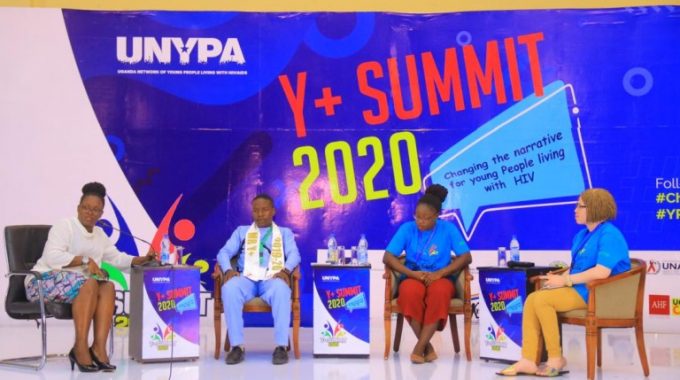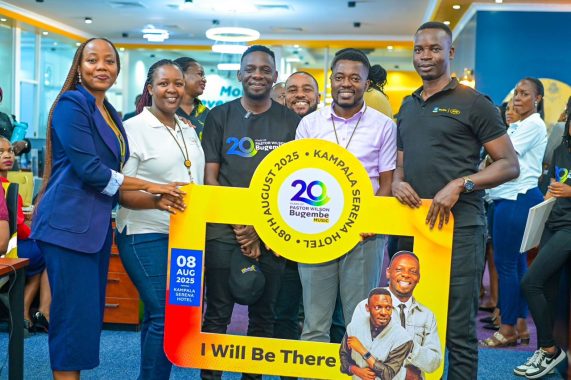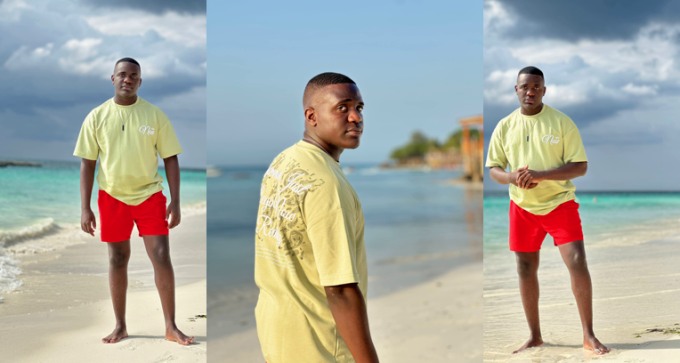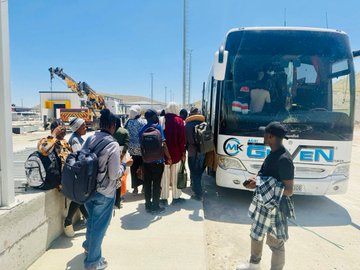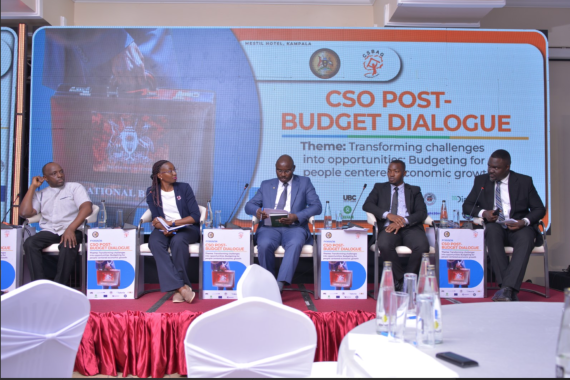The Y+ summit is an annual three 3 days assembly for young people living with HIV that brings together peer leaders, ambassadors, advocates and HIV/SRHR champions together with other stakeholders from government, members of parliament, UN agencies, country ambassadors in Uganda, CSOs and the private sectors to share best practices and lessons for effectively addressing HIV/SRHR and gender challenges faced by the all Young people living with HIV in Uganda Since its inception in 2017, the Y+ summit has brought together over 1903 YPLHIV with a number of activities that help them to gain skills, information and knowledge on how to come the barriers that limit them from developing due to the HIV epidemic together with partners from all Government ministries, private sectors, NGOs, Health workers towards finding solutions to improved HIV/SRHR services and information to all young people living with HIV in Uganda.
Previously the Y+ summit has been run under 3 different themes “everybody counts” in 2017, “Confronting HIV with Bold steps” in 2018 and “Peers making it Happen!!” in 2019. This year, the summit will be held under the theme the “ Changing the narrative of young people living with HIV ” and sub themes of:
1. Gender equality and women empowerment for young people living with and affected by HIV/AIDS.
2. Youth champions in advocacy
3. Quality of life for young people living with HIV.
1. Gender Equality and Women Empowerment for young people living with and affected by HIV/ AIDS.
The theme recognises that HIV prevention and treatment efforts require not just a clinical approach but also the need to address gender inequalities for young people particularly adolescent girls and young women living with and affected by the burden of HIV/AIDS. The focus of this theme shall be on providing information on the effects of Gender inequalities including Gender stereotypes, Gender Based Violence, power imbalances which increase the risk of HIV infection and violence against adolescent girls and young women. It aims to address the sociocultural and economical constraints that increase the vulnerability of the girl child and recognise the responsibility of boys and men as key stakeholders in promoting gender equality and women empowerment. The theme envisions young people becoming human rights watchdogs in their communities who are able to identify, report any forms of violence& support survivors & victims of the violence.
2. Young champions in advocacy.
The theme aims to equip young people with lobbying and advocacy skills on current HIV and SRHR issues that need to be addressed at local, national and international levels. The theme shall provide a platform for youth ambassadors to engage with key stakeholders on the different issues affecting them such as stigma and discrimination which contributes to the silence and fear associated with HIV and AIDS amongst youth in their communities. The summit looks at building and strengthening abilities of young people as an advocacy movement to use media as a tool for HIV/SRHR advocacy to demand for their human rights, increase demand for HIV/SRHR service delivery as well as share experiences of young people living with HIV on various platforms. More so the media plays a key role in passing on key massages to the communities, therefor the young people will be orientated on how to present key issues affecting them.
3. Quality of life for young people living with HIV.
Since 2014, the world has been working towards the 90-90-90 targets established by UNAIDS. These targets envision 90% of people living with HIV will know their HIV status by 2020, 90% of people who know their HIV positive status will be on treatment, and 90% of people on treatment will have a suppressed viral load. However, there is a growing belief that 90-90-90 stops short of optimising care for people living with HIV. Therefore, to meet the full needs of young people living with HIV, we have to orient the young people on the fourth 90, where all young people living with HIV have a good health related quality of life. (Opinion: How to th Achieve the “Fourth 90” for HIV by Amy Flood, 19 September 2019) The theme will focus on orienting young people on the existence of the fourth 90 and how it aims to improve the quality of life for young YPLHIV by promoting treatment literacy, adherence to ARVS, information on nutrition, creating good relationships with health workers, care takers guardians and parents. The discussions shall be centered on the relevance of self- care and mental health awareness for young people as well as strategies on how to overcome HIV related criminalization in the communities from which they live. The young people will also be empowered with basic skills of starting up small Income generating Activities (IGA) for economic empowerment to reduce over dependency and ensure young people are able to afford basic health care.
Purpose of the Y+ Summit
Yes, young people are disproportionately affected by HIV and AIDS, but we believe they are also the solution to ending the epidemic. As the response struggles to curb adolescent HIV infection rates, it is very crucial to support young people to champion the response – as leaders, partners and advocates. The purpose of the Y+ Summit is to create a platform for learning and sharing best practices for effective HIV/SRHR programming for young people. This is done by strengthening the abilities of young people in leadership and advocacy collaborative meeting that specifically seeks to give young people an authentic voice, technical capacity building, peer-to-peer exchange, create a dedicated space and opportunity for all young people living with HIV as leaders who are at the forefront of supporting and creating an enabling environment for young people living with HIV in Uganda. on HIV/SRHR, Income generating Activities (IGA) in order to create a pool of peers empowered to render peer support to AYPLHIV in the different aspects of life to support positive living with HIV.
Objectives
General Objectives
To provide information on the dangers of Gender inequalities, how it contributes to the HIV epidemic and to overcome it the community.
To provide a platform for youth ambassadors to engage with key stakeholders on the different issues affecting them and how to address them.
To orient young people on the existence of the fourth 90 and how it aims to improve the quality of life for young people living with HIV.
Promote inclusiveness of young people living with HIV including key populations in the design: implementation and monitoring of such HIV related programing
Specific objectives
To share with young HIV advocates, the latest HIV/SRHR data &information.
To support young people, know their role in ending the HIV epidemic in Uganda
To follow up on all Government commitments towards the HIV response in Uganda
To create a platform for young people to hold stakeholders accountable on HIV/ SRH policy, formulation and implementation at all levels and financing
To provide young people with Income Generating Activities skills and information
To build the capacity of young people on how to mobilize their peers in the community towards improved livelihood.
Target
The Y+ Summit 2020 is planned to reach a total of 500 stakeholders including 350 young people living with HIV including AYPLHIV peer leaders/supporters, Y+ Beauty pageant ambassadors as well as young key populations. The summit shall also extend to at least 50 HIV negative young people from schools, universities and communities, 50 stakeholders from districts, Ministry of Health, Education, Gender and Finance, Members of parliament, Government legal, Law and Human Rights Commissions, 50 NGOs that impact the lives of young people living with HIV in Uganda, the 8 UN agencies in Uganda, 10 embassies in Uganda and the 32 media stations in Uganda. This will be done through the different communication channels like Facebook (UNYPA), Twitter (@unypa1), live stream, Instagram (UNYPA-official) and on our website ( https:// unypa.org ).
Expected Results or Outcomes from the summit
Ministries of health, education, gender and finance to share updates on what it has done towards the HIV response in Uganda.
Young people reporting all forms of gender based violence in the community
Young people conduct dialogues with community on the dangers of HIV, stigma and discrimination in the community
Ministry of health, education, gender and finance engages young people living with HIV in all the planning process in the HIV response
Action plans developed with SRHR/HIV needs of all young people living with HIV at national, regional and international level.
Commitments made from stakeholders towards the HIV response in Uganda
Young girls and boys starting up Income Generating Activities
Develop a position paper with young people’s needs for follow up on
Self-esteem of young people living with HIV developed and improved on issues affecting them.
Sapiosexual & Ambivert




